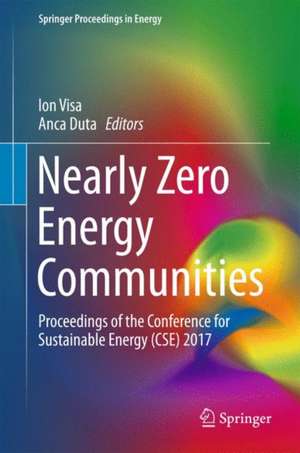Nearly Zero Energy Communities: Proceedings of the Conference for Sustainable Energy (CSE) 2017: Springer Proceedings in Energy
Editat de Ion Visa, Anca Dutaen Limba Engleză Hardback – 3 sep 2017
This event was organized under the patronage of the International Federation for the Science of Machines and Mechanisms (IFToMM) - the Technical Committee Sustainable Energy Systems, of the European Sustainable Energy Alliance (ESEIA) and of the Romanian Academy of Technical Sciences.
| Toate formatele și edițiile | Preț | Express |
|---|---|---|
| Paperback (1) | 1071.93 lei 38-44 zile | |
| Springer International Publishing – 11 aug 2018 | 1071.93 lei 38-44 zile | |
| Hardback (1) | 1244.59 lei 6-8 săpt. | |
| Springer International Publishing – 3 sep 2017 | 1244.59 lei 6-8 săpt. |
Din seria Springer Proceedings in Energy
- 18%
 Preț: 1389.30 lei
Preț: 1389.30 lei - 18%
 Preț: 1237.80 lei
Preț: 1237.80 lei - 18%
 Preț: 1388.53 lei
Preț: 1388.53 lei - 24%
 Preț: 821.94 lei
Preț: 821.94 lei - 18%
 Preț: 1895.99 lei
Preț: 1895.99 lei - 18%
 Preț: 1109.16 lei
Preț: 1109.16 lei - 24%
 Preț: 1108.17 lei
Preț: 1108.17 lei - 18%
 Preț: 1386.92 lei
Preț: 1386.92 lei - 18%
 Preț: 1592.92 lei
Preț: 1592.92 lei - 18%
 Preț: 2126.60 lei
Preț: 2126.60 lei - 24%
 Preț: 1126.84 lei
Preț: 1126.84 lei - 18%
 Preț: 1265.39 lei
Preț: 1265.39 lei - 18%
 Preț: 738.06 lei
Preț: 738.06 lei -
 Preț: 420.97 lei
Preț: 420.97 lei - 18%
 Preț: 1111.22 lei
Preț: 1111.22 lei - 18%
 Preț: 1224.18 lei
Preț: 1224.18 lei - 18%
 Preț: 1409.03 lei
Preț: 1409.03 lei - 18%
 Preț: 1224.68 lei
Preț: 1224.68 lei - 18%
 Preț: 948.79 lei
Preț: 948.79 lei - 15%
 Preț: 638.57 lei
Preț: 638.57 lei - 18%
 Preț: 952.40 lei
Preț: 952.40 lei - 18%
 Preț: 1239.37 lei
Preț: 1239.37 lei - 18%
 Preț: 1848.33 lei
Preț: 1848.33 lei - 18%
 Preț: 1018.55 lei
Preț: 1018.55 lei - 18%
 Preț: 1378.59 lei
Preț: 1378.59 lei - 18%
 Preț: 1106.12 lei
Preț: 1106.12 lei - 18%
 Preț: 962.18 lei
Preț: 962.18 lei - 18%
 Preț: 1230.84 lei
Preț: 1230.84 lei -
 Preț: 428.68 lei
Preț: 428.68 lei - 15%
 Preț: 641.53 lei
Preț: 641.53 lei - 18%
 Preț: 1115.14 lei
Preț: 1115.14 lei - 18%
 Preț: 1230.35 lei
Preț: 1230.35 lei - 24%
 Preț: 1041.84 lei
Preț: 1041.84 lei - 18%
 Preț: 947.98 lei
Preț: 947.98 lei - 24%
 Preț: 784.30 lei
Preț: 784.30 lei - 18%
 Preț: 948.61 lei
Preț: 948.61 lei - 18%
 Preț: 1243.60 lei
Preț: 1243.60 lei - 18%
 Preț: 1015.23 lei
Preț: 1015.23 lei - 24%
 Preț: 786.47 lei
Preț: 786.47 lei
Preț: 1244.59 lei
Preț vechi: 1517.79 lei
-18% Nou
Puncte Express: 1867
Preț estimativ în valută:
238.17€ • 246.07$ • 198.12£
238.17€ • 246.07$ • 198.12£
Carte tipărită la comandă
Livrare economică 19 martie-02 aprilie
Preluare comenzi: 021 569.72.76
Specificații
ISBN-13: 9783319632148
ISBN-10: 3319632140
Pagini: 732
Ilustrații: XIII, 732 p. 440 illus.
Dimensiuni: 155 x 235 mm
Greutate: 1.22 kg
Ediția:1st ed. 2018
Editura: Springer International Publishing
Colecția Springer
Seria Springer Proceedings in Energy
Locul publicării:Cham, Switzerland
ISBN-10: 3319632140
Pagini: 732
Ilustrații: XIII, 732 p. 440 illus.
Dimensiuni: 155 x 235 mm
Greutate: 1.22 kg
Ediția:1st ed. 2018
Editura: Springer International Publishing
Colecția Springer
Seria Springer Proceedings in Energy
Locul publicării:Cham, Switzerland
Textul de pe ultima copertă
This book addresses the main challenges in implementing the concepts that aim to replace the regular fossil-fuels based energy pattern with the novel energy pattern relying on renewable energy. As the built environment is one major energy consumer, well known and exploited by each community member, the challenges addressing the built environment has to be solved with the consistent contribution of the community inhabitants and its administration. The transition phase, which already is under implementation, is represented by the Nearly Zero Energy Communities (nZEC). From the research topics towards the large scale implementation, the nZEC concept is analyzed in this book, starting with the specific issues of the sustainable built environment, beyond the Nearly Zero Energy Buildings towards a more integrated view on the community (Chapter1) and followed by various implementation concepts for renewable heating & cooling (Chapter 2), for renewable electrical energy production at communitylevel (Chapter 3) and for sustainable water use and reuse (Chapter 4). As the topic is still new, specific instruments supporting education and training (Chapter 5) are needed, aiming to provide the knowledge that can drive the communities in the near future and is expected to increase the acceptance towards renewable energy implemented at community level.
The sub-chapters of this book are the proceedings of the 5th edition of the Conference for Sustainable Energy, during 19-21 October 2017, organized by the R&D Centre Renewable Energy Systems and Recycling, in the R&D Institute of the Transilvania University of Brasov.
This event was organized under the patronage of the International Federation for the Science of Machines and Mechanisms (IFToMM) - the Technical Committee Sustainable Energy Systems, of the European Sustainable Energy Alliance (ESEIA) and of the Romanian Academy of Technical Sciences.
This event was organized under the patronage of the International Federation for the Science of Machines and Mechanisms (IFToMM) - the Technical Committee Sustainable Energy Systems, of the European Sustainable Energy Alliance (ESEIA) and of the Romanian Academy of Technical Sciences.
Caracteristici
Includes supplementary material: sn.pub/extras
